|
| NEWS |
 |
| World military expenditure reaches new record high as European spending surges |
|
This month the SIPRI Military Expenditure Database was updated. The new data showed that world military spending grew for the eighth consecutive year in 2022 to an all-time high of $2240 billion. By far the sharpest rise in spending (+13 per cent) was seen in Europe and was largely accounted for by Russian and Ukrainian spending. However, military aid to Ukraine and concerns about a heightened threat from Russia strongly influenced many other states’ spending decisions, as did tensions in East Asia.
|
|
|
Read more | Download the SIPRI Fact Sheet | Access the database
|
|
|
 |
| SIPRI hosts Romanian Prime Minister |
|
On 31 March, SIPRI hosted a visit from HE Nicolae Ciucă, Prime Minister of Romania. The visit tied into an event on the topic ‘Threats and Opportunities in the Black Sea Area’ and was moderated by Stefan Löfven, Chair of the SIPRI Governing Board. During the event, Prime Minister Ciucă gave a keynote speech on the strategic importance of the Black Sea region, citing its geopolitical significance as a bridge between Europe, Asia and the Middle East, as well as its importance in terms of military defence, food security, energy and connectivity sectors. During the visit, SIPRI conducted an interview with Prime Minister Ciucă for the SIPRI Spotlight film series.
|
|
|
Read more | Watch the SIPRI Spotlight interview
|
|
|
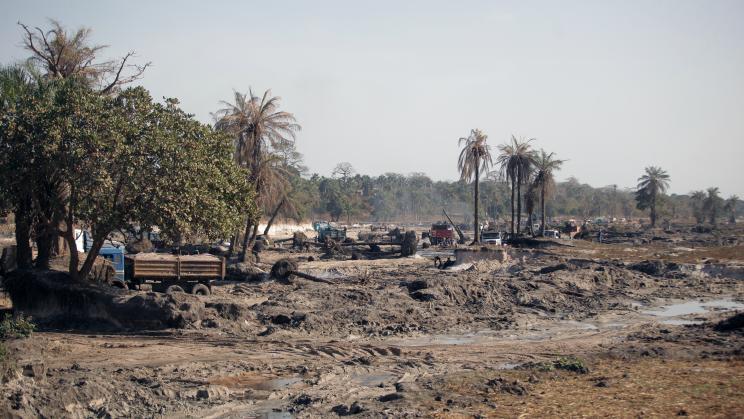 |
| New SIPRI films: Climate change and security in West Africa |
|
Climate change is altering the security landscape on a global scale, with West Africa experiencing the effects at a faster rate than the rest of the world. The regional impact of climate change is compounded by political tensions, violent conflicts and complex humanitarian emergencies. Given the need for locally anchored analyses and responses to climate-related security risks in West Africa, the Friedrich-Ebert-Stiftung’s Peace and Security Centre of Competence Sub-Saharan Africa (FES), the Norwegian Institute of International Affairs (NUPI), and SIPRI have interviewed leading experts on these issues. The interviews are available now on SIPRI’s YouTube channel.
|
|
|
Read more | Watch the SIPRI Spotlight interviews
|
|
|
 |
| New video series on biosecurity risks and emerging technology |
|
SIPRI is pleased to launch a new video series that explores biosecurity risks linked to emerging technologies and considers how these risks can be addressed. The series features international experts from the research fields of genetics, bioethics, international affairs and microbiology. This work, funded by the British Foreign, Commonwealth and Development Office, is part of a wider project that examines dual-use technologies that have implications for the proliferation, development and use of biological weapons.
|
|
|
Read more | Watch the SIPRI Spotlight interviews
|
|
|
 |
| SIPRI and UNODA launch joint initiative on responsible innovation in AI for peace and security |
|
This month SIPRI and the United Nations Office for Disarmament Affairs (UNODA) launched a three-year joint initiative on responsible innovation in artificial intelligence (AI) for peace and security. The initiative, which is funded by a decision of the Council of the European Union, aims to support greater engagement from the civilian AI community in mitigating the risks that the misuse of civilian AI technology can pose to international peace and security.
|
|
|
Read more
|
|
|
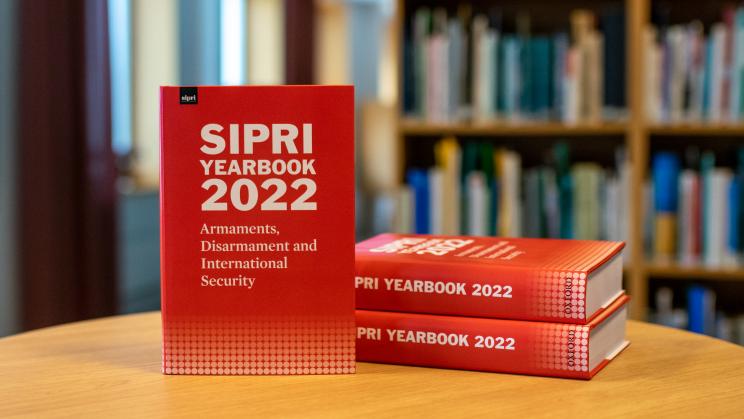 |
| SIPRI Yearbook 2022 summary now available in Farsi and Korean |
|
Thanks to SIPRI’s translation partners, the summary of SIPRI Yearbook 2022 is now available in both Farsi and Korean. Released in June 2022, the 53rd edition of the SIPRI Yearbook provides detailed information on nuclear arms control and non-proliferation issues; cutting-edge analysis of developments in conventional arms control in 2021; regional overviews of armed conflicts and conflict management; in-depth data and discussion on military expenditure, international arms transfers and arms production; and comprehensive coverage of efforts to counter chemical and biological security threats. It is available in print and online from Oxford University Press. Summaries are also available in Catalan, Dutch, French, Italian, Japanese, Spanish and Swedish.
|
|
|
Read more | Download in Farsi | Download in Korean
|
|
|
|
| COMMENTARY |
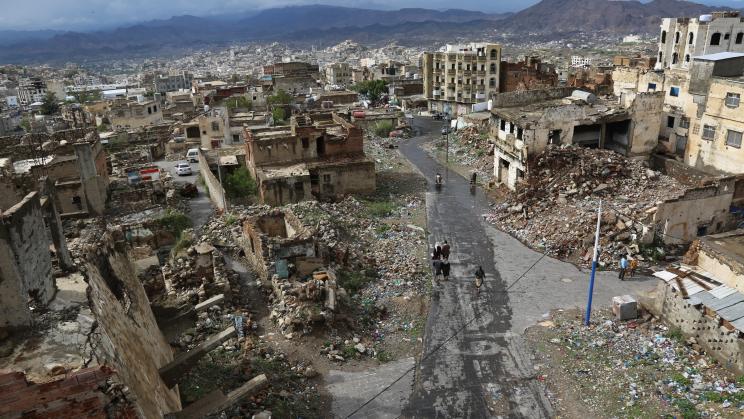 |
| Yemen: Local grievances call for internationally supported local solutions |
|
This SIPRI WritePeace Blog discusses the ongoing civil war in Yemen and the recent negotiations between the Iran-backed Houthi rebels and Saudi Arabia, facilitated by China. While the potential deténte could contribute to overall de-escalation in the region, it is unlikely to resolve the underlying domestic tensions and grievances that fuel the conflict. Yemen is deeply divided, with various tribal, ideological, religious and separatist groups vying for control and influence. The Houthis and the Yemeni government have not resumed major fighting since the truce’s breakdown, but the conflict has taken on a new character, with both sides targeting and disrupting local economic resources and revenue streams. The blog emphasizes the need for increased local autonomy and governance to address Yemen’s deep-seated problems.
|
|
Read the SIPRI WritePeace Blog
|
|
|
 |
| Lessons on climate resilience and peacebuilding from Ethiopia and the Dry Corridor |
|
This WritePeace Blog summarizes the findings of a study that SIPRI conducted on the World Food Programme’s (WFP) resilience projects implemented in Ethiopia, Guatemala and Honduras. These programmes aimed to address challenges linked to the impacts of climate change. However, the study found that these programmes can inadvertently create new vulnerabilities or miss opportunities to build and sustain peace if local conflict sensitivities are not considered. Moreover, natural resource management and governance should be integrated into resilience programming in resource-scarce areas, and resilience programming should always be sensitive to the risk of conflict over access to natural resources. The study recommended that the WFP should make peacebuilding and reducing conflict risk central considerations in their resilience programming.
|
|
Read the SIPRI WritePeace Blog
|
|
|
|
|
|
 |
| External articles |
|
The following articles by SIPRI experts were recently published:
|
|
|
| RECENT EVENTS |
| |
| 25 April 2023 |
| Mismatch or on track: Does global military spending align with national security priorities? |
|
On 24 April, new SIPRI data on global military expenditure showed that spending reached a new record high. SIPRI and the UN Institute for Disarmament Research (UNIDIR) hosted an online webinar to showcase the data and discuss the latest trends in global military spending. The webinar considered whether military spending aligns with national security priorities, explored the main factors driving the spending increases and examined the role of transparency.
|
|
Read more
|
| |
| 19 April 2023 |
| Thinking Security |
|
The world is experiencing a set of acute environmental crises as part of a generally darkening security horizon—which, when taken together, are creating a new era of risk. This event reviewed the complex global security situation taking into account factors such as climate change, biodiversity loss, pollution and resource scarcity. It featured Dan Smith, SIPRI Director; Dr Robert Egnell, Vice-Chancellor of the Swedish Defence University; Dr Line Gordon, Stockholm Resilience Centre Director; and Stephanie Blenckner, SIPRI Communications Director.
|
|
Read more | Watch the livestream
|
| |
| 23 March 2023 |
| SIPRI co-organizes side event at United Nations 2023 Water Conference |
|
On 23 March, SIPRI, the Swedish government, the Somalian government and the Stockholm International Water Institute, co-organized a side event for the UN 2023 Water Conference. The side event was titled ‘Commitments to Accelerate Cooperation on Water, Environment, Climate and Peace’ and was held at the UN Headquarters in New York.
|
|
Read more | Watch the livestream
|
|
| STAFF NEWS |
SIPRI is currently accepting applications for:
- Senior Researcher and Programme Director, European Security Programme (Closing date: 12 May)
|
|
Read more
|
|
|
| PUBLICATIONS |
 |
| Climate, Peace and Security Fact Sheet: Iraq |
|
This publication highlights how Iraq is particularly vulnerable to extreme weather events caused by climate change, such as droughts, floods, heatwaves and dust storms. These events have detrimental effects on various aspects of Iraqi life, including the environment, agriculture, water availability and public health. Moreover, the impacts of climate change aggravate existing vulnerabilities, leading to a higher risk of instability and conflict in the region. The fact sheet aims to provide an overview of the current situation regarding climate change in Iraq.
|
|
Read the fact sheet
|
|
|
 |
| Trends in World Military Expenditure, 2022 |
|
This SIPRI Fact Sheet examines key regional and national military expenditure data for 2022 and trends over the decade 2013–22. The fact sheet reveals that world military expenditure rose by 3.7 per cent in real terms in 2022, to reach a record high of $2240 billion. Global spending grew by 19 per cent over the decade 2013–22 and has risen every year since 2015. Russia’s invasion of Ukraine was a major driver of the growth in spending in 2022.
|
|
Read the SIPRI Fact Sheet
|
|
|
 |
| Five Urgent Questions on Ecological Security |
|
The increasing pressure of ecological disruption on people and on security means that ideas and policy on peace and security must increasingly address the need for ecological security. This paper poses five research questions concerning: (a) the amplification of antimicrobial resistance (pathogens that are increasingly drug-resistant); (b) the physiological consequences of pollution; (c) the loss of nature’s contribution to people’s well-being; (d) local and regional ecological tipping points; and (e) detrimental organisms and processes that thrive in the rapidly changing planet.
|
|
Read the SIPRI Insights on Peace and Security
|
|
|
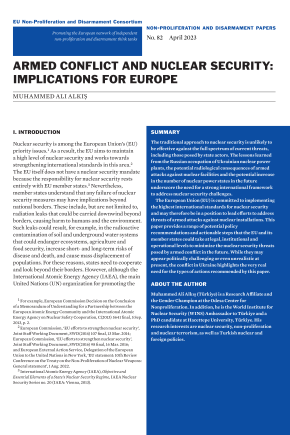 |
| Armed Conflict and Nuclear Security: Implications for Europe |
|
The EU is committed to implementing the highest international standards for nuclear security and may therefore be in a position to lead efforts to address threats of armed attacks against nuclear installations. This paper provides a range of potential policy recommendations and actionable steps that the EU and its member states could take at legal, institutional and operational levels to minimize the nuclear security threats posed by armed conflict in the future. While they may appear politically challenging or even unrealistic at present, the conflict in Ukraine highlights the very real need for the types of actions recommended by this paper.
|
|
Read the report
|
|
|
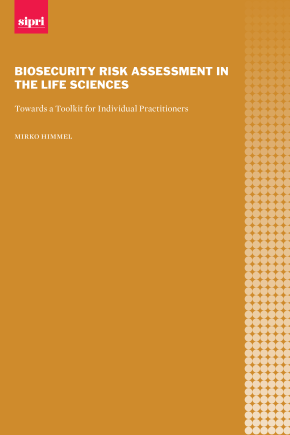 |
| Biosecurity Risk Assessment in the Life Sciences: Towards a Toolkit for Individual Practitioners |
|
There are a number of potential risks and unintended consequences associated with research at the intersection of biological sciences and emerging technologies, including the risk of misuse for malicious purposes. While there are established biorisk management approaches to dealing with these dangers, gaps remain. This paper focuses on the role of individual practitioners in contributing to a larger culture of biosafety and biosecurity.
|
|
Read the report
|
|
|
 |
| Compliance with International Humanitarian Law in the Development and Use of Autonomous Weapon Systems: What does IHL Permit, Prohibit and Require? |
|
How international humanitarian law (IHL) rules should be interpreted and applied in the context of autonomous weapon systems (AWS) remains, in some respects, unclear or disputed. With a particular focus on human–machine interaction, this report aims to facilitate a deeper understanding of this issue. Informed by an in-person expert workshop that SIPRI convened in November 2022 and contributions to the international policy discussion on AWS, the report maps areas of common ground and identifies aspects that warrant further clarification concerning what key rules of IHL, particularly those guiding the conduct of hostilities, permit, prohibit and require in the development and use of AWS.
|
|
Read the report
|
|
|
 |
| Climate Change and Security in West Africa: Regional Perspectives on Addressing Climate-related Security Risks |
|
In view of the need for locally anchored analyses and responses to climate-related security risks in West Africa, Friedrich-Ebert-Stiftung’s Peace and Security Centre of Competence Sub-Saharan Africa, NUPI and SIPRI organized a series of meetings for West African experts, researchers and civil society organizations, from November 2021 to November 2022. This brief summarizes the working group’s analysis of climate-related security risks in West Africa, responses to those risks and recommendations for actions to address them.
|
|
Read the report
|
|
|
 |
| Developing Good Practices in Export Control Outreach to the NewSpace Industry |
|
This paper takes stock of the increasing missile proliferation risks posed by NewSpace companies. The paper argues that to mitigate these risks, states need to raise awareness among NewSpace actors and strengthen compliance with relevant mechanisms. A means to achieve this would be an effective outreach strategy that would include tailored use of outreach tools. Moreover, multilateral forums, such as the Missile Technology Control Regime, the Hague Code of Conduct and the Wiesbaden Process can help states develop good practices for outreach to the NewSpace industry. Proactive measures are crucial to ensure the safe and peaceful use of outer space.
|
|
Read the SIPRI Insights on Peace and Security
|
|
|
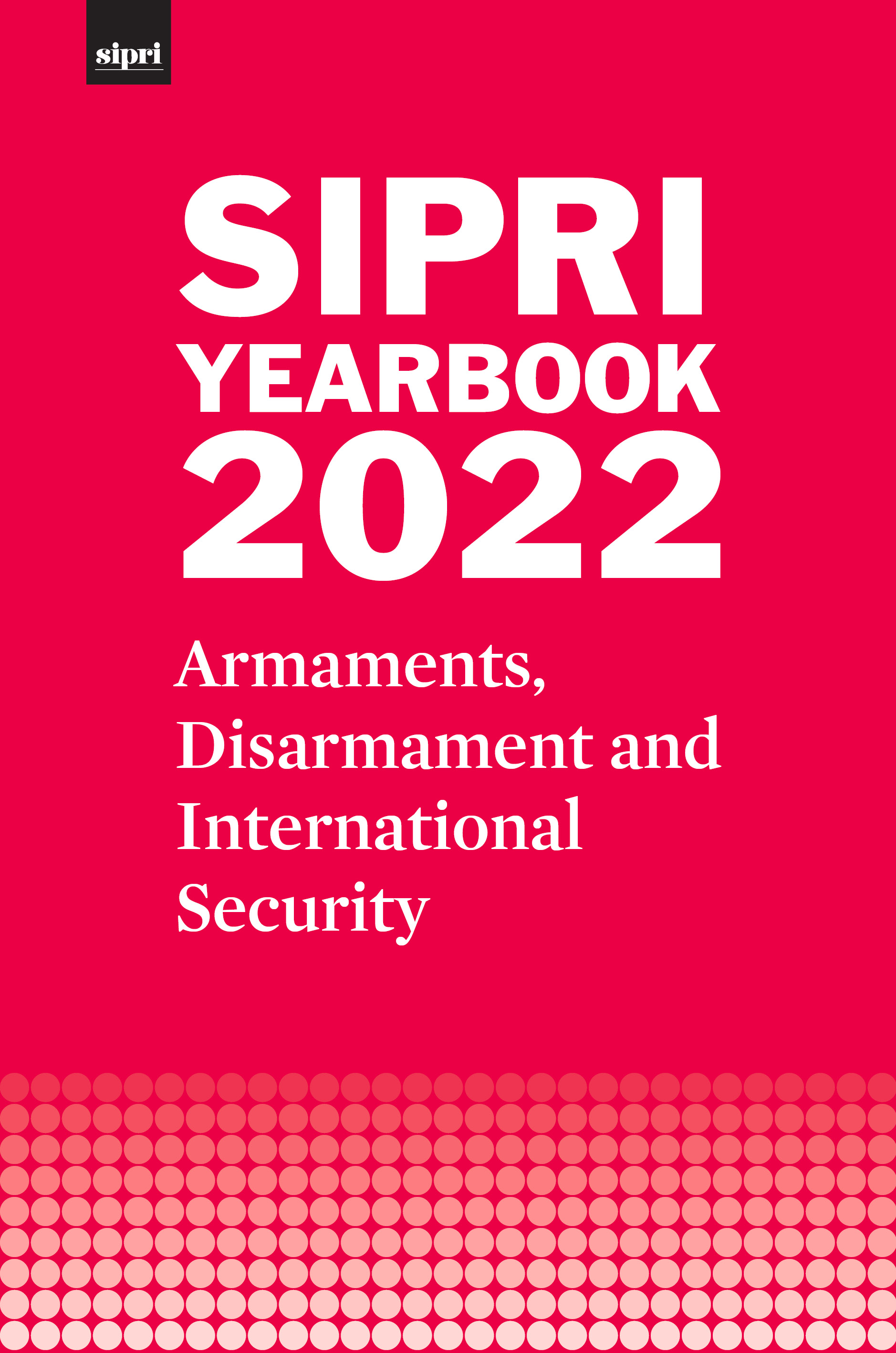 |
| SIPRI Yearbook 2022 |
SIPRI Yearbook 2022 presents a combination of original data in areas such as world military expenditure, international arms transfers, arms production, nuclear forces, armed conflicts and multilateral peace operations with state-of-the-art analysis of important aspects of arms control, peace and international security. In addition to its detailed coverage of nuclear arms control and non-proliferation issues, the latest edition of the SIPRI Yearbook includes
- insight on developments in conventional arms control in 2021;
- regional overviews of armed conflicts and conflict management;
- in-depth data and discussion on military expenditure, international arms transfers and arms production; and
- comprehensive coverage of efforts to counter chemical and biological security threats.
|
|
Browse the contents page | Download the summary (PDF) | Download the sample chapter on world nuclear forces (PDF) | Order SIPRI Yearbook 2022
|
|
|
| |
|
|
|
|
|
|